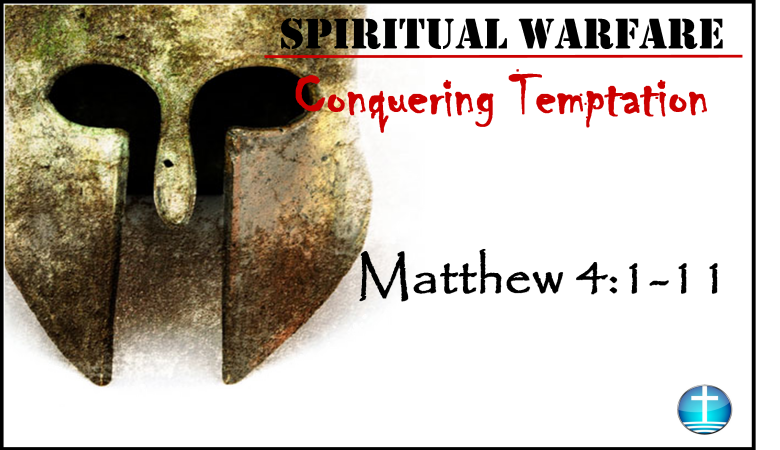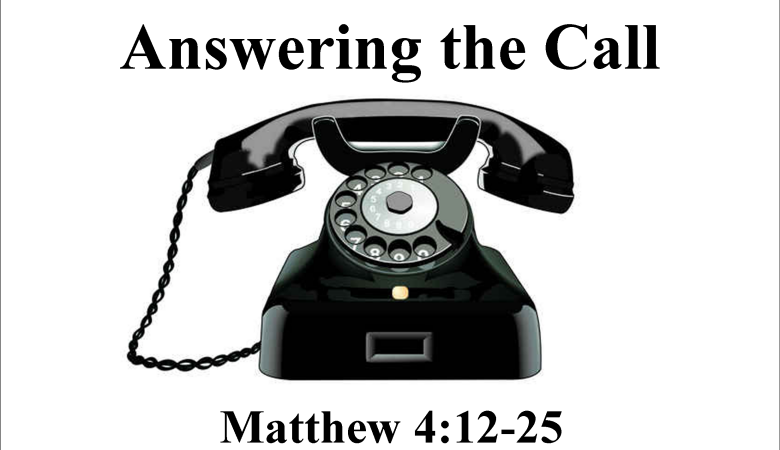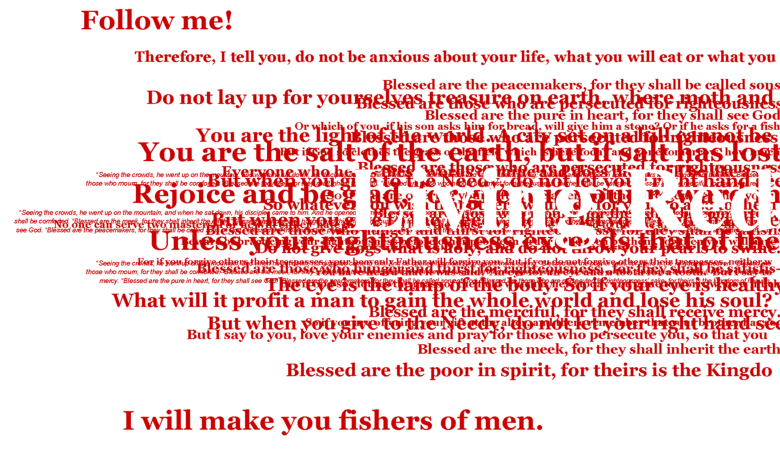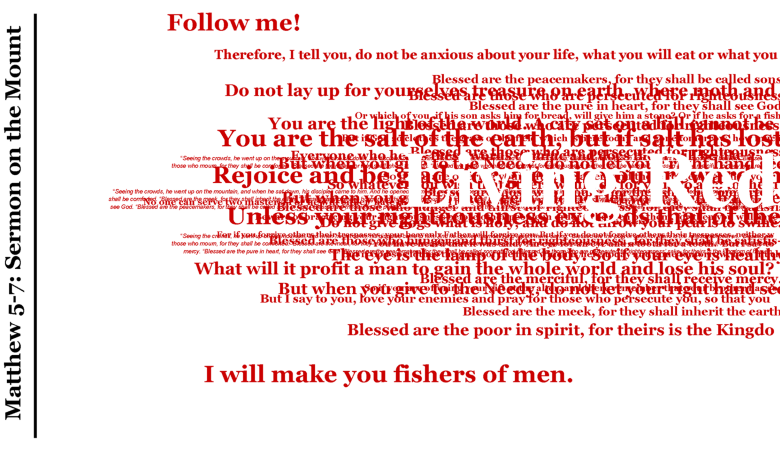Matthew 18:6,10,12-14 ~ "Protecting The Little Ones"
Imagine a parent. Not a hard thing to do seeing how so many of us are one. This parent is gentle, patient, and kind. They are diligent to not just bark commands at their children, but carefully explain and instruct them. I think we could say we all aspire to be that kind of parent and teacher. And yet, there are still times where you have explained something over and over and over again. Your child knows what is expected. You know your child knows. And your child knows that you know that they know what they should or should not be doing in that situation. And so there is no need for any further careful explanation. You become frank and direct. Living in Texas and New Mexico, in these moments the parents’ whole accent changed slightly, and their words became slightly slurred. For example, instead of saying “son, you know you shouldn’t be doing that. Don’t forget that there will be consequences” the words would come out more like this: “Boi, you best watch youself, you’s bouts to get a whoopin’!” There’s a clear and frank warning. That’s what we’ll be looking at this morning. Jesus is instructing and warning his disciples.
Last week, we started chapter 18 and saw how the disciples were concerned about greatness and personal gain and Jesus warned that with that kind of heart they could not even enter the kingdom of heaven. They needed to humble themselves like children and be concerned with Christ’s greatness, his glory, and his desires. We also saw how he used the word children as an analogy for the lowly person who was humbled before Christ, a believer, a humbled and lowly believer. This week, we’re going to be breaking up the passage in an interesting manner. Our belief and custom is to go verse by verse to understand the whole word of God, so I just wanted to reassure you all that we’re not skipping over anything. Jesus’ teaching illustration revolved around children in verses 1-6. In verse 7, He begins to speak more specifically about temptations to sin, but in verse 10 he returns to the child analogy. It’s one thing for me and Joshua to preach verse by verse and each of us just pick up where the other left off, but given that there is what is called a chiastic structure to this passage in which the illustration concerning children serves as bookends and is broken up with a teaching of a slightly different focus, I thought would make most sense for me to teach on both bookends and allow Joshua to take the middle section when he returns. So let’s read verses 1-14, but we’re going to focus on verse 6 and verses 10-14. [READ MATT. 18:1-14]
vs.6. Vs. 5 and 6 are both part of one sentence. Vs. 5 contains instructions and a promise. Instructions to be humbled and to put others before ourselves. Our promise is that we then receive Jesus. We don’t earn greatness, but receive him, the only one who is truly great. Vs. 6 contrasts the instruction and promise with a warning. The great millstone that Jesus is speaking of is one that was so large that it required the use of donkeys in order to turn it. So imagine being in the ocean with that thing fastened around your neck. There’s no possibility of holding that thing up. It represents not only punishment, but one that is very severe, reserved for some of the worst criminals, and inescapable. And this can be a somewhat troubling verse to read. Parents, how many times have you seen your child say or do something that caused you to ask, “Where in the world did you hear that?!” only to realize that it was you. Or how many times have we simply been too careless or hasty to realize that what we were saying or doing was going to cause our children to respond in a colossal meltdown. We have all sinned. Sin entangles. We have all caused others to sin. And that’s the problem. How can we ever receive the promise of this instruction in vs. 5 if we’re promised an inescapable doom?
First of all, we have to be careful not to confuse the language. As I read this passage and kept likening this phrase “cause to sin” to a “stumbling block”. There are two different greek words that are translated as “stumbling block”. One which means something that causes one to stumble . The other greek word is “skandalon”, and that is actually the root word that is translated here as “cause to sin”. Skandalon is a noun which means a trap stick, so quite literally, a bent sapling, a snare. The actual verb that is uses here is “skandalizo” which means to put a snare in the way, or to entice to apostasy. Apostasy is the deliberate repudiation and abandonment of the faith one has professed. Causing someone to stumble is to cause some one to commit a sin but yet they remain sure in their faith. This verse is talking about setting traps for people that cause them to reject the faith in Christ they once claimed.
Vs.10. “See that you do not despise on of these little ones.” The word “despise” used here comes from two greek words. The first means to have an opinion, to be mentally disposed to a certain position. The second simply means against in this context. So to have a predisposition against the lowly and humble believers. Jesus tells his disciples not to look down, disrespect, or think lightly of them.
Here’s where it gets interesting. “For I tell you that in heaven their angels always see the face of my Father who is in heaven.” Here’s a common reaction when someone reads this passage: reading, reading, reading, “angels?... what? Are those guardian angels? I’ve never been sure about that. What was I reading again? But, guardian angels?” We get ADHD when we read this verse. Ooh, shiny thing! So a couple things. This verse is probable the strongest case for “guardian angels” and yet, it’s still not clear enough to come to a decisive conclusion. Here is what we do know. The word used for angel means messenger. They are servants of God. In Revelation 1, John writes of the angels of the 7 churches he wrote to. It is clear here that God has assigned angels to watch over His children, but we do not know that every person has their own guardian angel who follows them like a shadow.Also, let’s not get distracted from the thrust and message of the passage. Jesus warned the disciples in vs.6 that to lead someone away from their faith in Christ would incur inescapable consequences. Echoing that, He cautions in verse 10 not to despise the childlike in faith. We already know that God knows all and sees all, but just in case we take that knowledge for granted he uses this illustration to teach us. There are angels who are always before Him whom He has commissioned to act and work for His children. God does not think little of any of His children. He has taken great care and concern over them. He sent His Son to die for them. Jesus is telling His disciples to do the same. Furthermore, I think this connects back to the warning from vs.6 and carries a faint echo of that “boi, you gonna get a whoopin’” tone we mentioned. If we despise and think little of the childlike in faith, we may be laying snares that entrap them and lead them away from Christ. This would also connect back to verses 1-5 of not being truly humbled ourselves and being found not able to enter the kingdom of heaven. That charge is very strong.
A number of years ago, Kyla’s father, Larry, was helping her grandfather, Beal, out on the family farm. They needed to dig a new line to the septic tank. At some point, they encountered an obstacle. Beal, insisted they dig below. Larry insisted they go over. Kyla’s grandfather was a farmer. He had no formal training, but he was an experienced labor. Even into his 90’s, he had a business in which he rebuilt old tractors and resold them. Obviously, he was an intelligent man who knew his way around the farm and work matters. If you dig down, gravity will work with you. If you go up, you’ll lose pressure and flow. Larry however was a licensed plumber. He knew you would still have enough pressure and flow. He was also trying to warn Beal about other hazards of digging beneath and it would be much more difficult. The disagreement became very heated. However, it was still Beal’s farm and he made it clear that the job was going to be done his way, and he was going to stand out there and make sure that Larry did it. Kyla’s aunt Jeanne was outside watching the whole incident unfold. Upon Beal’s winning of the argument, the two men were just about to proceed with the next step of their task. Larry was going to dig. Beal and Jeanne were standing together. Larry turned to Jeanne and said “You’re gonna want to move, because stuff is about to fly right in your direction.” He then turned to his father, Beal, who was standing right next to Jeanne, and said, “You stay right there” So Jeanne moved, Beal stood still, and Larry started digging. Sure enough, the plumber was right, and stuff started flying all over Beal. And he didn’t budge. He stayed right there leaning on his shovel and getting covered sewage. In his pride, he wouldn’t admit his mistake or heed the warnings given to him. If we refuse to be humbled and listen to Christ, our punishment will be much worse than getting covered in sewage.
vs.11. Depending on what version your Bible is, it may or may not contain vs.11. If it does, there should be a note somewhere explaining that vs.11 was not actually contained in the earliest manuscripts which means that it was added in later by an unknown editor and not under the leading of the Holy Spirit as this book was being written. That is why many of you will not even find it in your Bible.
Vs.12-14. This is one of the most well known and beloved parables in the Bible. However, we have to be careful to note the context. Luke’s gospel recounts this same parable, but the context of the two tellings give them completely different meanings. Luke’s account reassures us of the Lord’s love and sacrifice for the lost. In Matthew, the parable comes in the midst of warnings and refers more specifically to the lost sheep as the believer who has gone astray from faith in Christ. The shepherd does not count his losses. He goes after the one. He goes after the weak. He treks out at the end of the day, when the predators and dangers increase greatly. He goes into the caves and rocky crags. He does not value the life of the one more than the 99, but rejoices more greatly because now he has been restored. Now none of the members of the flock have been lost.
This is the love and care Jesus shows to restore the lowly who have gone astray. He protects all his sheep. He watches over them. He loves them. He pursues them. So his teaching to the disciples carries both a command and a warning. We are to imitate Jesus. We are to receive the lowly, the difficult, the needy, the broken, because that is what He did. We are to restore the lost as He does. We are to pursue them. We must never count our losses, but go into the danger, into the dark. Church, we have been faced with this situation a number of times before and will be challenged again at some point. We have acknowledged to each other the ways in which we did not heed this command. There were times that instead of searching and pursuing and calling for the sheep to come home, we sat by and simply hoped for the best. We must continue to meditate on this passage and be ready to act. We must never count our losses, be satisfied with a number and sit still. We must not be fearful of the dangers that may arise when we confront the one who has strayed. To act in that way is to despise them. To act in that way is to act contrary to His will, the one who see them, the one who sends angels to work for them. We do not want to be found opposing God.
Turn with me to Deuteronomy 6:4-9. This is how we are to teach our children, but this should also be the way act everywhere. We have been blessed to see a number of people put their faith in Jesus in the last few years. For the childlike in faith who are still weak, still learning and growing (as we all should be of course), this must be the way we act and teach. We can celebrate their faith, but if we do not help them become more and more rooted and firm in Christ, then we despise them by thinking so little of them and their well being. See that you do not despise one (even the smallest amount) of these little ones.
Judges 2:10. And all that generation also were gathered to their fathers. And there arose another generation after them who did not know the LORD or the work that he had done for Israel. After reading this passage, I think it is so easy to see the relevance and importance of the passage we just read from Deuteronomy. It this not the scene in Canada today? How many times have we seen this before? The church that is composed of people that are all relatively the same age, and as the years go on, their faith stays only with them. It does not pass on to their children, or their grandchildren, or their neighbors, or their coworkers, or their friends. Consequently, their faith dies with them, and their church dies out. We must not despise the little ones. This includes our children. This includes people who are different ages than us. It includes people who have completely different lives and interests than us. We must not despise the little ones.
We also must not assume our greatness as the disciples did. We must not assume we are sinless. We must not neglect to consider if our words or actions are snares that will entangle the weak. As a child, my family went to a church in which it was assumed that if a child grew up in the church, in a Christian home, that the child was also a Christian and would simply grow in understanding as they grew in years. That culture had been there for generations. I believe there were many Christians there, but as an adolescent who was beginning to ask what salvation really was and how to ensure that I was a Christian, so many of the people could not answer me. That is a snare. A snare is a habit or belief that not merely causes someone to sin, but to fall away from Christ. If we drag our family to church week in and week out and fail to live as people who are continually changing, shedding off sin, growing in our discipline, growing in our intimacy and reliance on the Lord, then they too will only see inconvenient rules. They will walk away from the message of rescue and life that was right before them because we laid traps for them. If we are apathetic and complacent people, we will lay snares. If we pursue better lives but do not give ourselves away completely to receive the lowly ones, then we too are laying snares. I could go on about this forever, but I do not have the time. And the point remains the same. If the twelve disciples had to beware of laying snares, then so must we. We must painstakingly look at our home, our work, our church and consider if we teach something with our words or actions that lead away from faith in Christ. Grave punishment awaits if we don’t. And if we see something we need to repent of, then simply turn and humble yourself life a child. Don’t forget that Christ is your shepherd too. He desperately seeks our repentance and sanctification as well.
Series Information
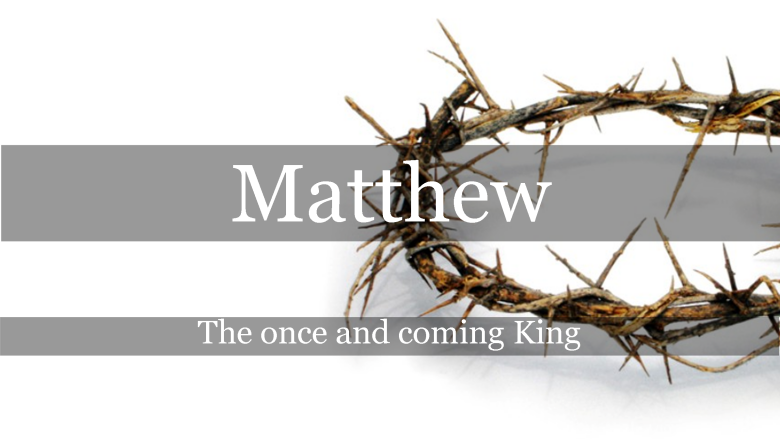
The Gospel of Matthew is a story about a once and coming King. Jesus of Nazareth is the Son of David, the long awaited for Messiah. He has come once, and Matthew tells the story of His arrival, ministry, sacrificial atoning work on the cross, and His promise to return soon.


